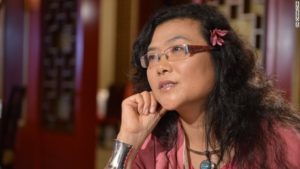
As the Black Lives Matter movement took over some of the headlines, China typically dismissed racism as a Western problem. Author Zhang Lijia begs to differ, in The Wire. “The Chinese government claims to have “zero tolerance” for racism, but there have been no reports that anyone has been punished for the actions against the Africans in Guangzhou or elsewhere,” she adds.
Zhang Lijia:
Women who married Black men were often insulted publicly for 下嫁 – marrying beneath them – whilst women with white husbands were sometimes accused of being “gold diggers”.
It dawned on me that as they grappled with modernisation, many Chinese were placing themselves in the middle of a racial hierarchy: above the black and below the white.
The outbreak of racial tension in Guangzhou last April did trigger some reflection. One unidentified African resident of the city – a man – made a video confessing his love for China and uploaded it on social media. In fluent Chinese he said he had been living in China for nine years, regarded himself as Chinese and considered China his mother. Sadly, he was rewarded with a deluge of taunts and jeers.
“Don’t be a hypocrite!” one Chinese netizen replied. “You love China only because China is richer than your country.” Another slung an insult. “You aren’t a Chinese at all. Don’t outstay your welcome. You lot are cockroaches and rats!”
China’s rising position in the world has led to the rise of nationalism, which is all apparent in those messages. With this lack of public awareness, racist discourse has become an integral part of Chinese nationalism.
In a book about race and medicine in China, sinologist Frank Dikötter pointed out that in China darker races were “discursively represented as hereditarily inadequate and waiting to go into extinction.”
As it has rippled across the globe, the BLM movement has forced civil society in several Asian countries to confront their own racial and ethnical prejudices. The result has been a spate of protests and public debates on issues such as the discrimination against Papuans in Indonesia, the privilege of the Chinese in Singapore and the death of Indians in custody in Malaysia.
Let’s face it: racism exists in every society. Professor Barry Sautman, a professor in the Division of Social Science at the Hong Kong University of Science and Technology wrote a paper, ‘Anti-Black Racism in Post Mao China,’ in which he called for an enforced legal deterrent. “Without it, no place in the world can diminish racial discrimination,” he said to me in an interview.
As a Chinese citizen I can only hope that the government will take the opportunity created by the rise of the BLM movement to deal frontally with racism in China, allow its people to discuss and show their support for it and encourage public debate, as Japan is doing.
The Chinese government claims to have “zero tolerance” for racism, but there have been no reports that anyone has been punished for the actions against the Africans in Guangzhou or elsewhere.
Zhang Lijia is a speaker at the China Speakers Bureau. Do you need her at your (online) meeting or conference? Do get in touch or fill in our speakers’ request form.
Are you looking for more experts on cultural change at the China Speakers Bureau? Do check out this list.
